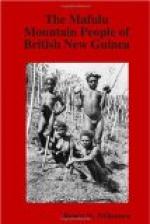Father Egedi speaks of their hair as being “generally black, rarely bright, and more rarely chestnut”; and as to this, I would refer to the fact that the predominating colour of hair among the Mafulu is dark or darkish brown, so that in this respect the Kuni apparently tend more to the black-haired coast type of native than do the Mafulu.
Concerning matters other than physique and language, as I only passed through the Kuni district, and did not attempt serious ethnological investigation there, I can say but little beyond what I learn from Father Egedi’s articles and a few other sources; and the material thus available only deals with a few questions.
It would appear from Father Egedi’s observations that the relationship between villages arising from the splitting up into two or more of an original family village is not so permanent as I believe it to be among the Mafulu. Dr. Seligmann says [122] that among the Kuni Father Egedi “could find no trace of intermarrying groups, or groups of clans claiming common descent,” which statement applies to my investigations among the Mafulu. He further says [123] that “The Dilava folk” (Dilava is a Kuni village) “marry into all the surrounding villages; and when a death occurs it is the head of the family of the deceased who says when mourning shall cease”—statements of which the former, and I believe the latter, could hardly be correctly made concerning the Mafulu. He also refers [124] to Kuni war chiefs, an office which does not exist among the Mafulu, and apparently understands that the office of these war chiefs is non-hereditary, a statement which could not be made of any Mafulu chief; and he refers [125] to a funeral ceremony which is quite unknown in Mafulu. But his statement [126] that the kufu (club-house) system seems less developed than in Mekeo would apply very strongly to the Mafulu.
The Kuni superstitious remedies for illnesses, as described by Father Egedi, are quite different from those of Mafulu, and their food restrictions, as enumerated by him, are in some respects substantially distinct from those of the Mafulu, though some of them are more or less similar.
According to him Kuni women, though they may not enter the village kufu or club-house, are allowed upon its platform, which is not the case with the Mafulu emone; and eldest sons of Kuni influential people may not enter into the kufu until their parents have given a specific feast, which custom is apparently not identical with that of the Mafulu above described by me, and which applies to all sons of all members of the village, and not merely to those of influential people.




